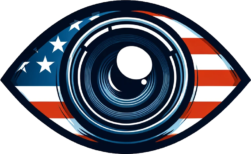Welcome to the smart city, where technology promises to turn your daily grind into a symphony of automated convenience—if you don’t mind a little surveillance, that is. Picture a life where every street corner bristles with sensors and cameras, recording your every move with unblinking precision. Traffic lights adjust based on real-time data, facial recognition systems track your comings and goings, and even the trash cans monitor your recycling habits. This isn’t the plot of a dystopian novel, but the here and now. As we navigate this labyrinth of smart tech and incessant monitoring, let’s take a closer look at a day in the life of the modern citizen, where the price of progress is your personal privacy.
7:00 AM
You wake up to the voice of your smart home assistant, as cheerful as a wacky morning radio DJ. “Good morning! It’s a sunny day with no rain in sight,” it chirps.
You drag yourself to the shower, only to be reminded of the ongoing drought. “Keep it short,” the assistant warns, as the city is monitoring your water usage and you don’t want to incur any fines.
7:30 AM
With breakfast downed, you get your child ready for school. Walking to the bus stop, your phone pings with the bus’s precise arrival time. You arrive just in time.
Your child’s school ID sports an RFID chip, and as they step onto the bus, it beeps in acknowledgment. They’ll get scanned again when exiting the bus and when walking into the school building. This all feels normal for them.
8:00 AM
Back at home, your spouse prepares to run errands in the city. They summon a ride share, and within minutes, an autonomous vehicle glides up to the curb. The fare, however, is higher than usual. “Congestion pricing,” the app explains. It’s supposed to reduce traffic, but all it does is trim your budget. The city’s watchful eye tracks every journey, charging a premium for the privilege of existing in its congested heart.
8:30 AM
You leave for work in your decade-old car, a trusted mechanical vehicle in a world of autonomous and all-electric alternatives. As you drive closer to the city, you pass by more and more automated license plate readers. They say they aren’t for tracking you, but you know that points on a map make a line, plainly showing your general route.
Entering a “low emissions zone,” you see signs indicating that your car is too old and will be charged an additional fee, regardless of its spotless emissions tests.
9:00 AM
Arriving at your office, facial recognition unlocks the door, and thermal cameras immediately scrutinize your body temperature. When a slight fever is detected, you are directed to a small backroom for further examination.
Instead of seeing a doctor or nurse, you use a kiosk to answer a few questions and recheck your temperature. Everything checks out, so you’re cleared to enter. However, before you leave, the attendant at the desk stops you to warn that in the future, you will have to take a rapid test to prove you aren’t sick. Fortunately, that policy hasn’t been fully implemented yet, sparing you the hassle for now.
9:15 AM
Starting work, you notice that an AI-driven tool you normally use is down for maintenance, so you have to revert to manual methods. It’s more challenging than usual, as your skills have atrophied somewhat from overreliance on the AI.
Nevertheless, you need to get busy because attention-tracking software monitors your productivity and reports it to your manager. Blink too much or get distracted and your productivity score drops. Determined to meet your KPIs for the month, you focus intently on your tasks.
12:00 PM
Lunchtime provides a brief reprieve, so you decide to hit the gym. You opt to get there on a rideshare scooter to avoid any further fees for your vintage vehicle. During the ride, the rideshare company tracks your location data and reports it in real-time to the city via a shared API.
The city’s traffic command center, monitoring your movements, sees themselves like air traffic controllers, overseeing and centrally managing the flow of traffic. Should they deem it necessary, they could activate bollards around the city to block vehicle traffic entirely. You dread the thought of commuting home on a day that happens.
At the gym, a facial recognition system scans you in. It’s efficient, sure, but every scan feels like a notch on Big Brother’s belt.
After working out, you grab a quick bite to eat and log it into a fitness app. The app, paired with your smartwatch, reports your physical activity and dietary habits to your insurance company. They call it wellness; you call it overreach. Still, enticed by the discount this program provides on your bill, you opted in.
5:00 PM
The workday finally ends, and you join a coworker for a drink. As you stroll to the bar, smart streetlights silently capture your gait and facial features, adding to the city’s vast trove of surveillance data. At the bar, the world feels momentarily normal, a fleeting escape from the relentless tracking.
7:00 PM
Pulling into your neighborhood, you notice the flashing lights of law enforcement at your neighbor’s house. A ShotSpotter system mistook their early holiday fireworks for gunfire. The police arrive, on edge and unsure of what to expect, only to find Mr. Johnson with a few bottle rockets. The network of cameras and audio recorders around the city isn’t cheap to maintain, so the police issue him a hefty ticket for setting off fireworks a few days before it would have been allowed.
Home at last, you find your smart thermostat has dialed down the air conditioning to save energy, turning your sanctuary into a sweat lodge. The house is uncomfortably warm, and even your pet seems miffed by the heat. As you adjust the thermostat back to a comfortable level, you are forced to accept a notice reminding you that adjusting the temperature is bad for the environment.
Unbeknownst to you, earlier that day, a drone from your insurance company flew over your property and identified an unfinished project in your backyard. This triggered an automated compliance notice, which you’ll receive in the mail soon. The notice warns that if you don’t address the “trash” promptly, you could face penalties or even policy cancellation.
8:00 PM
Exhausted, you order food from your favorite restaurant. The delivery comes with a congestion fee, naturally. As you relax in front of the TV, you notice the ads are eerily relevant, almost as if they’ve been reading your mind. You head to bed early, knowing your alarm is set to ring 15 minutes earlier tomorrow because of a major event in town.
—
As smart city technology extends into every corner of our lives—from bustling cities to quiet suburbs and rural retreats—it’s crucial to address these changes. Banish Big Brother is mobilizing efforts through lobbying, activism, and lawsuits to tackle the relentless spread of surveillance technology. This isn’t just an urban issue anymore. It’s affecting every part of our communities.
The Banish Big Brother podcast offers deep dives into these pressing issues and practical advice on taking action. Ready to join the effort? Get involved, take action, and together, we’ll tell Big Brother to back off. Let’s reclaim our right to privacy and keep the future free from constant surveillance.

Zach Varnell
Zach Varnell is a cybersecurity expert and advocate for privacy and individual liberty. He is a founding member of Banish Big Brother, a nonprofit dedicated to combating invasive surveillance. He also runs Asteros, a security firm that helps software teams and compliance-driven organizations understand and reduce their real-world risk. His insights have been featured in publications like Infosecurity Magazine, Threatpost, ZDNET, and the Washington Examiner.
